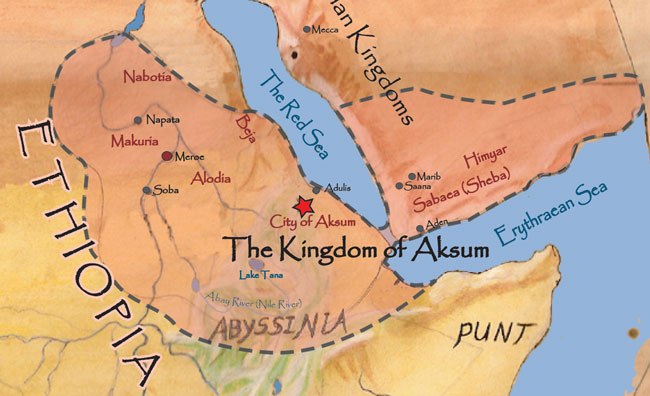
Brief History of the Axumite Kingdom in Ethiopia
The Kingdom of Axum /Aksum was an ancient kingdom in present day Ethiopia and Eritrea.The Axum or Aksum as they were known were a group that descended from indigenous Africans and Arabian settlers who settled in Africa. It is important to know that though the Axum were descendants of Arabs they were Christian and not Muslim. It is believed that the Aksum had the 10 commandments written on stone tablets. They are also said to have the biblical Ark of the Covenant. The Axum had a language Geez used in present day Ethiopian and Eritrean Orthodox churches.
 Aksum was regarded as one of the superpowers of its time together with Persia, China and Rome. The Kingdom lasted from 100 to 940AD. In 300AD, the Axum overthrew the Meroe kingdom rulers and became the center of commerce and trade in Northeast Africa. The Axum’s center of trade was the seaport at Adulis which was at the Red Sea. The Adulis spoke Greek and traded in Alexandria.
Aksum was regarded as one of the superpowers of its time together with Persia, China and Rome. The Kingdom lasted from 100 to 940AD. In 300AD, the Axum overthrew the Meroe kingdom rulers and became the center of commerce and trade in Northeast Africa. The Axum’s center of trade was the seaport at Adulis which was at the Red Sea. The Adulis spoke Greek and traded in Alexandria.
The Axumite empire stretched from West Africa to the Mediterranean and across to the Indian Ocean. Axum trade consisted of the following:
- Town of Colone was the center of ivory trade
- Cloths were traded with Egypt
- Murrhine
Trade in Aksum was done using Aksum coinage as currency to exchange values for goods and services. Aksum coins had a cross to reflect their Christian faith and demonstrate its central role in society. The Axum controlled their own currency and minted their own currency which gave them protection over their own economic affairs. Aksum traders travelled to India and China exporting ivory, gold and emerald wheat, barley in exchange for silk and spices. This doctrine of unequal exchange eventually led to the collapse of Aksum Empire.
The Aksum military did great exploits and were known throughout the world to use iron tools spears and shields in battle. Their military strategy also included the use of animals such as elephants to literally crush their enemies and were victorious in many battles.



